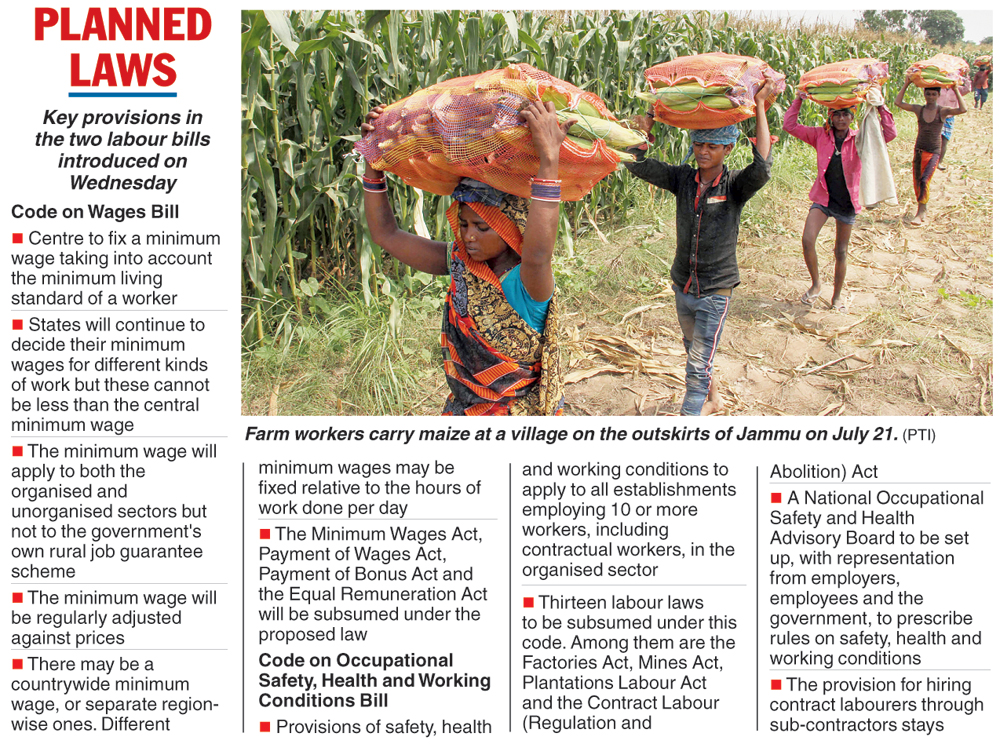The Narendra Modi government on Wednesday introduced a bill prescribing a universal minimum “floor wage” for workers but kept the Centre’s own rural job guarantee scheme outside its ambit.
It also introduced a bill on occupation safety but left out the unorganised sector. Critics cited several provisions in the bill to accuse the government of favouring industry over the workers.
The Code on Wages Bill seeks to prescribe a yet-unspecified minimum wage for the entire country, covering both the organised and unorganised sectors. The states will be free to notify their own minimum wages for different kinds of work as long as these are not less than the central minimum wage.
The Centre will fix the floor wage after consulting a tripartite body of employers, employees and state governments.
According to the bill, the floor wage will take into account the minimum living standards of a worker “in such manner as may be prescribed”. Critics said the bill should have specified a mechanism for fixing the minimum wage.
The bill allows the option of a countrywide minimum wage as well as that of a region-wise minimum wage.
Different floor wages may be prescribed for different periods of work, keeping in mind the interests of workers such as domestic help who may work for small periods for each employer.

The Telegraph
Social activist Nikhil Dey criticised the decision to leave the Mahatma Gandhi National Employment Guarantee Act, which provides for up to 100 days’ unskilled work for every rural household a year, outside the bill’s purview.
“Current rural job scheme wages are less than the state minimum wages in several states. But the Centre is not sincere about protecting workers’ interests,” he said.
Academic Ravi S. Srivastava, chairperson of the Institute of Development Studies, Jaipur, suspected that the bill’s failure to prescribe how the minimum wage would be calculated could be exploited to short-change the workers.
According to the bill, the minimum wage will regularly be adjusted against the rising prices, with the “appropriate government” (state or central) consulting experts, employees and employers.
An expert committee appointed by the labour ministry had recommended Rs 375 as the daily minimum universal wage or, alternatively, five regional minimum wages ranging between Rs 342 and Rs 447.
The other bill, the Code on Occupational Safety, Health and Working Conditions Bill, applies only to the organised sector — including factories, mines, plantations and the beedi and cigarette industries -— but covers both regular and contractual workers.
Some 13 existing central labour laws will be subsumed under it. This will do away with the 12 definitions of wages that have provoked much litigation, a labour ministry release said.
However, Srivastava said the bill had left out several worker-friendly provisions that existed in the current laws.
For example, he said, the Factories Act 1948 mandated overtime pay for any factory worker beyond 9 hours a day or 48 hours a week, at twice his ordinary wage rate. But the code is silent on overtime pay, leaving it to the “appropriate government”, which can be the Centre or a state government.
“There have been instances of governments taking decisions to suit the employers. By vesting the authority to the ‘appropriate government’, the bill leaves scope for policymaking in favour of employers,” Srivastava said.
Pradeep Shinde, a teacher at JNU’s Centre of Informal Sector and Labour Studies, said that contractual workers, hired through sub-contractors, are made to work longer with less pay and little leave. He regretted that the bill would perpetuate this system.
Neither bill was discussed thoroughly at the Indian Labour Conference, an advisory body on labour matters, which has not met for four years, Srivastava said.
“There is great opacity in the way the government prepared these codes. Many old provisions have been left out and many changes have been introduced without much discussion. The government wants to deregulate the labour sector to make it easy for industry,” he said.
Srivastava argued that even then, these bills were unlikely to boost industrialisation. India’s average wage is a third of China’s and about 74 per cent of manufacturing workers in India’s formal sector are contractual workers, which means Indian industry is already enjoying the benefits of a liberalised labour system, he said.
Virjesh Upadhyay, general secretary of the RSS-affiliated Bharatiya Mazdoor Sangh, lauded both codes. “The rural job scheme is governed under a separate law,” he said, dismissing the activists’ objections.
“The code on occupational safety will apply to all establishments with more than 10 employees, unlike the Factories Act that applied only to establishments with over 20 employees. This bill has proposed better measures for more workers.”
Labour is a concurrent subject in the Constitution. The Centre has decided to prepare four labour codes to rationalise the thicket of 35 central labour laws and dozens of state laws. Two of these were introduced as bills on Wednesday, while two others — the Labour Code on Industrial Relations and the Labour Code on Social Security and Welfare — are yet to come.
Labour codes have been on the government agenda for the past 40 years. The first draft labour code was proposed in 1980. The Second National Labour Commission in 2002 proposed a consolidation of the labour laws and suggested six codes, which the trade unions rejected.











